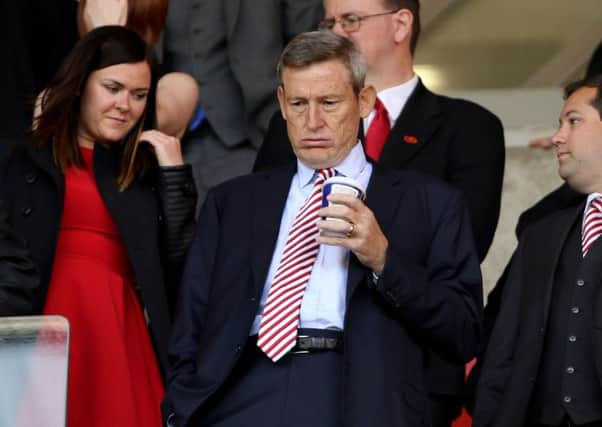Chris Young: Financial figures highlight Sunderland's problems on and off-the-field


But in her sole on-the-record chat with the Echo - back in 2013 after Sunderland had posted a familiar hefty annual loss - the then chief executive spoke of the new television deal being used to ease the club’s debts and usher in a more fiscally stable period at the Stadium of Light.
As the Premier League reaches the end of that television contract, which has seen Sunderland roughly bank £70million a year, the Black Cats are no better off.
Advertisement
Hide AdAdvertisement
Hide AdANOTHER big annual loss - this time £25m or so for the 2014-15 financial year - was posted with Companies House last week. For all the flak pummelling the chops of Mike Ashley up the road, Newcastle made a £32m profit in the same period.
Sunderland’s figures were actually worse than the previous year, with losses increasing due to a combination of gate receipt and television money falling, and the wage bill continuing to soar.
The Black Cats are far from alone in football by spending more than the contents of their piggybank, yet the accounts emphatically demonstrate that the club is no better off the field than it is on it.
Sunderland desperately need a successor to Byrne who is as competent in the business world as they are in the footballing one.
Advertisement
Hide AdAdvertisement
Hide AdThe sobering conclusion from the current set-up is that without Ellis Short, Sunderland would be at the knackers yard.
Privately, Short will freely admit the mistakes he has made at the Stadium of Light and as chairman, he has to take overall responsibility for the instability stemming from the seemingly never-ending conveyor belt of managers and awful signings arriving at the club over the last four years.
He will have to hold his hand up if Sunderland are relegated.
But despite some public perceptions that Short hasn’t put his hand in his pocket, Sunderland remain dependant on him to cover the annual losses.
Advertisement
Hide AdAdvertisement
Hide AdIf there was one crumb of comfort from the accounts, it was included in the accompanying report stating Short’s readiness to continue writing off £20m or £30m a year.
“The directors have received indications from the ultimate controlling party of their willingness and ability to continue to support the operations of the group and company for the foreseeable future,” was a very telling line.
But if Sunderland are to emerge from the red, then they must stop wasting money so liberally.
Sunderland’s wage bill of £70m - which puts them in the top 10 of the Premier League - is staggeringly poor value for a club which persistently finds itself in the doldrums of the table. It’s also slightly ironic, given that Short was such a proponent of bringing salaries under control from this television deal.
Advertisement
Hide AdAdvertisement
Hide AdIt’s not that Sunderland pay far more than their top flight rivals. It’s a collective issue of having too many players who don’t even contribute - some that aren’t even at the club any more.
Take for instance Liam Bridcutt. He’s spent the last six months at Leeds, yet Sunderland have continued to pick up the tab for around half his wages.
That’s £200,000 or so up in flames.
It’s the same with the outstanding payments owed on transfer fees - an underestimated problem which Dick Advocaat could never quite believe.
For years, Sunderland have taken the DFS sofa policy of paying for players in a staggered structure. They’re still doing it.
Advertisement
Hide AdAdvertisement
Hide AdMost clubs do likewise, yet due to the huge turnover of personnel at the Stadium of Light, there’s again money going out the bank account for players who aren’t even at the club any more.
Money hasn’t just been wasted on the football side of the operation.
One director - which reading between the lines was Byrne - was paid more than £700,000. Newcastle chief executive Lee Charnley has hardly been a roaring success, but he’s had a pay rise to just (just!) £150,000.
Sunderland’s bid to get the books in order will be made or broken next week.
Advertisement
Hide AdAdvertisement
Hide AdThe Black Cats will either be banking £100m from the new television deal or facing a programme of severe costing as they rely on a £40m parachute payment.
The clear implication is that Short will continue to bankroll the club if they are relegated.
But as the accounts ominously make clear: “the directors consider the major risk of the business to be a significant period of absence from the Premier League”.
If Sunderland go down, then they need to come back up quick-sharp.